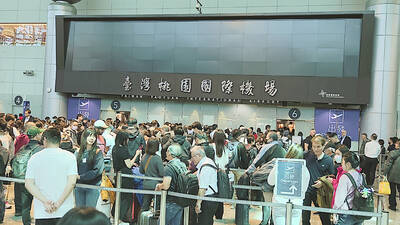Excessive use of consumer electronics could reduce brain size in children, as well as weaken neural pathways, leading to one-dimensional, rigid brain structures, experts said.
This overreliance on visual stimuli could limit the development of other areas of the brain, such as language or cognitive abilities, experts said at the Taiwan Child Neurology Society’s annual conference on child development at National Taiwan University Children’s Hospital on Sunday last week.
The brain grows quickly before age 10, said Weng Shih-ming (翁仕明), head of the Department of Speech-Language Pathology and Audiology at the National Taipei University of Nursing and Health Science.

Photo: Chiu Chih-jou, Taipei Times
Although there is no comprehensive census data from Taiwan, the latest surveys from the American Academy of Pediatrics (AAP) show that more time spent with electronics negatively affects brain development, including reducing brain size and delaying language skills, he said.
US experts believe that addiction to devices is as serious a problem as alcoholism, and even refer to it as “modern opium,” he added.
The AAP recommends that children under 18 months old should get no screen time at all, a maximum of one hour per day for those aged two to five years old and careful monitoring of screen time for those five to six.
Mary Hsin-Ju Ko (柯信如), a pediatric neurologist at the Hsinchu Mackay Memorial Hospital, gave an example of a clinical case in which a three-year-old’s family kept the TV on all day as “background noise” at home.
While the adults barely noticed it, she said, the stimulation overwhelmed the child, and led to issues with social interactions and communication.
After kindergarten teachers alerted the parents to these issues, they took the child to a doctor, who recommended lifestyle changes for the family, Ko said.
They reduced screen time, had more parent-child interactions, and after just two months, the child showed significant improvement, she added.
The Ministry of Health and Welfare’s Health Promotion Administration also highlighted that there is an increased risk of developing myopia with increased screen time.
Research shows that school children using screens for more than one hour a day have a 2.34-times higher risk of developing myopia compared to those who use it for under an hour, with younger children seeing more severe effects, the agency said.
Ko concluded that parents should not just hand over electronics to children, and that children need diverse stimulation to develop their brains.
Excessive screen time can hinder listening, speaking, reading, writing and math skills, and lead to hyperactivity or anti-social behavior, Ko added.
While making electronics entirely off-limits is likely not possible, parents should find age-appropriate content and accompany their children during screen time, which could mitigate some of its negative impacts.

The National Immigration Agency (NIA) said yesterday that it will revoke the dependent-based residence permit of a Chinese social media influencer who reportedly “openly advocated for [China’s] unification through military force” with Taiwan. The Chinese national, identified by her surname Liu (劉), will have her residence permit revoked in accordance with Article 14 of the “Measures for the permission of family- based residence, long-term residence and settlement of people from the Mainland Area in the Taiwan Area,” the NIA said in a news release. The agency explained it received reports that Liu made “unifying Taiwan through military force” statements on her online

A magnitude 5.7 earthquake struck off Taitung County at 1:09pm today, the Central Weather Administration (CWA) said. The hypocenter was 53km northeast of Taitung County Hall at a depth of 12.5km, CWA data showed. The intensity of the quake, which gauges the actual effect of a seismic event, measured 4 in Taitung County and Hualien County on Taiwan's seven-tier intensity scale, the data showed. The quake had an intensity of 3 in Nantou County, Chiayi County, Yunlin County, Kaohsiung and Tainan, the data showed. There were no immediate reports of damage following the quake.

Actor Darren Wang (王大陸) is to begin his one-year alternative military service tomorrow amid ongoing legal issues, the Ministry of the Interior said yesterday. Wang, who last month was released on bail of NT$150,000 (US$4,561) as he faces charges of allegedly attempting to evade military service and forging documents, has been ordered to report to Taipei Railway Station at 9am tomorrow, the Alternative Military Service Training and Management Center said. The 33-year-old would join about 1,300 other conscripts in the 263rd cohort of general alternative service for training at the Chenggong Ling camp in Taichung, a center official told reporters. Wang would first

MINOR DISRUPTION: The outage affected check-in and security screening, while passport control was done manually and runway operations continued unaffected The main departure hall and other parts of Terminal 2 at Taiwan Taoyuan International Airport lost power on Tuesday, causing confusion among passengers before electricity was fully restored more than an hour later. The outage, the cause of which is still being investigated, began at about midday and affected parts of Terminal 2, including the check-in gates, the security screening area and some duty-free shops. Parts of the terminal immediately activated backup power sources, while others remained dark until power was restored in some of the affected areas starting at 12:23pm. Power was fully restored at 1:13pm. Taoyuan International Airport Corp said in a